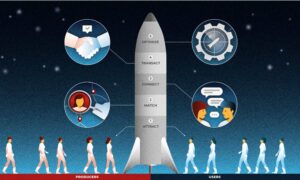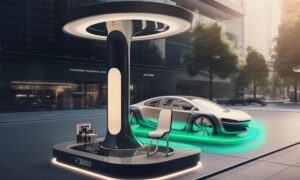Industrial solutions play a pivotal role in shaping the world we live in today and will continue to drive progress and innovation in the future. With the rapid advancement of technology, industries across various sectors are embracing industrial solutions to enhance efficiency, productivity, and overall performance. This article explores the importance of industrial power solutions and how they are revolutionizing different industries, while also addressing the challenges and opportunities they present. By understanding the potential of industrial solutions, we can envision a future where our world is powered by cutting-edge technology.
Importance of Industrial Solutions
Enhancing Efficiency and Productivity
Industrial solutions offer a multitude of benefits for businesses, particularly in terms of enhancing efficiency and productivity. By integrating advanced technologies and automation systems, industrial processes can be streamlined and optimized to minimize errors and maximize output. With the help of sophisticated software and hardware solutions, industries can achieve higher levels of accuracy, speed, and precision, leading to significant cost savings and improved overall performance.
Advancements in Automation
Automation has become a cornerstone of industrial solutions, revolutionizing the way industries operate. By leveraging robotics and intelligent machines, repetitive and labor-intensive tasks can be automated, freeing up human resources for more complex and creative endeavors. Automated processes not only increase productivity but also enhance safety by reducing the risk of human error and accidents. With advancements in artificial intelligence and machine learning, industrial automation continues to evolve, enabling industries to achieve unprecedented levels of efficiency.
Streamlining Operations
Industrial solutions help streamline operations by integrating various components and processes, creating a cohesive and interconnected system. Through the adoption of integrated software and hardware solutions, industries can seamlessly manage and monitor their operations, ensuring smooth coordination between different departments and functions. This level of integration enables real-time data analysis, improved decision-making, and proactive problem-solving, ultimately leading to enhanced operational efficiency and effectiveness.
Revolutionizing Industries
Manufacturing and Robotics
The manufacturing industry has witnessed a profound transformation with the integration of industrial solutions. Robotics and automation systems have revolutionized production lines, allowing for faster and more precise manufacturing processes. From assembly lines to quality control, robots are taking on tasks that were once exclusively performed by humans. This shift not only increases production capacity but also reduces costs and improves product quality. With the ability to adapt to changing demands and customize production, industrial solutions are enabling the manufacturing industry to thrive in a rapidly evolving market.
Energy and Sustainability
Industrial solutions are playing a crucial role in driving the transition to a sustainable and renewable energy future. From advanced monitoring and control systems in power plants to smart grid technologies, industrial solutions are optimizing energy generation, distribution, and consumption. By improving energy efficiency and harnessing renewable energy solutions, industries are reducing their carbon footprint and contributing to a greener and more sustainable world. Industrial solutions are empowering the energy sector to become more resilient, reliable, and environmentally friendly.
Transportation and Logistics
The transportation and logistics industry heavily relies on industrial solutions to optimize operations and improve overall efficiency. Technologies such as IoT-enabled sensors, real-time tracking systems, and advanced analytics are revolutionizing supply chain management. Industrial solutions enable real-time visibility, predictive maintenance, and route optimization, reducing transportation costs and improving delivery speed. By streamlining processes and increasing transparency, industries can ensure timely and secure delivery of goods, leading to enhanced customer satisfaction and loyalty.
Challenges and Opportunities
Technological Limitations
While industrial solutions offer immense potential, they also come with their fair share of challenges. One of the primary challenges is overcoming technological limitations. As industries adopt more advanced technologies, they must navigate issues such as compatibility, scalability, and security. Ensuring seamless integration of different systems and addressing potential vulnerabilities requires careful planning and investment in research and development. By addressing these challenges, industries can unlock the full potential of industrial solutions.
Workforce Adaptation
The adoption of industrial solutions necessitates a skilled and adaptable workforce. As automation systems and intelligent machines take on repetitive tasks, the workforce needs to acquire new skills to remain relevant in the changing job landscape. Industries must invest in training programs and upskilling initiatives to equip their employees with the necessary knowledge and expertise. By embracing lifelong learning and fostering a culture of innovation, industries can empower their workforce to thrive in an increasingly technology-driven world.
Scalability and Integration
Scalability and integration are crucial factors in the successful implementation of industrial solutions. As industries expand and evolve, they must ensure that their systems can handle increased volumes and complexities. Seamless integration of different components, software applications, and hardware devices is vital to achieve a cohesive and interconnected ecosystem. With careful planning and investment in scalable infrastructure, industries can leverage industrial solutions to drive growth and adapt to changing market dynamics.
Future Prospects
AI and Machine Learning
Artificial intelligence (AI) and machine learning are poised to play a pivotal role in the future of industrial solutions. These technologies have the potential to revolutionize industries by enabling predictive analytics, intelligent decision-making, and autonomous systems. AI-powered algorithms can analyze vast amounts of data, identify patterns, and make recommendations for process optimization and efficiency improvements. By harnessing the power of AI and machine learning, industries can unlock new levels of innovation and competitiveness.
IoT and Connectivity
The Internet of Things (IoT) is transforming the industrial landscape by connecting devices, machines, and systems to collect and exchange data. Industrial solutions leverage IoT technologies to enable real-time monitoring, remote control, and predictive maintenance. By harnessing the power of connectivity, industries can achieve higher levels of operational efficiency, reduce downtime, and optimize resource utilization. The ability to access and analyze data from various sources empowers industries to make data-driven decisions and drive continuous improvement.
Sustainable Solutions
Sustainability is a growing concern for industries across the globe, and industrial solutions are at the forefront of addressing this challenge. By integrating sustainable practices and technologies, industries can minimize their environmental impact and contribute to a more sustainable future. Industrial solutions enable energy-efficient processes, waste reduction, and the adoption of renewable resources. Through sustainable solutions, industries can align their business objectives with environmental stewardship and social responsibility, creating a positive impact on both the planet and their bottom line.
Conclusion
Industrial solutions are revolutionizing industries and powering the future of our world. By enhancing efficiency, streamlining operations, and embracing advanced technologies, industries are unlocking new levels of productivity, sustainability, and innovation. While challenges such as technological limitations and workforce adaptation exist, the opportunities presented by industrial solutions are immense. With the continued advancements in AI, machine learning, IoT, and sustainable practices, we can envision a future where industries thrive, and our world is shaped by cutting-edge technology.
FAQs
Q1: What are industrial solutions?
Industrial solutions refer to the integration of advanced technologies and systems to enhance efficiency, productivity, and performance in various industries. These solutions include automation, robotics, IoT, AI, and sustainable practices.
Q2: How do industrial solutions enhance efficiency?
Industrial solutions enhance efficiency by optimizing processes, reducing errors, and increasing productivity through automation, advanced analytics, and streamlined operations.
Q3: What industries are revolutionized by industrial solutions?
Industries such as manufacturing, energy, transportation, and logistics are among those significantly revolutionized by industrial solutions.
Q4: What challenges do industrial solutions face?
Industrial solutions face challenges such as technological limitations, workforce adaptation, and the need for scalability and integration.
Q5: What is the future of industrial solutions?
The future of industrial solutions lies in the advancements of AI, machine learning, IoT, and sustainable practices, enabling industries to achieve unprecedented levels of efficiency, innovation, and sustainability.



































